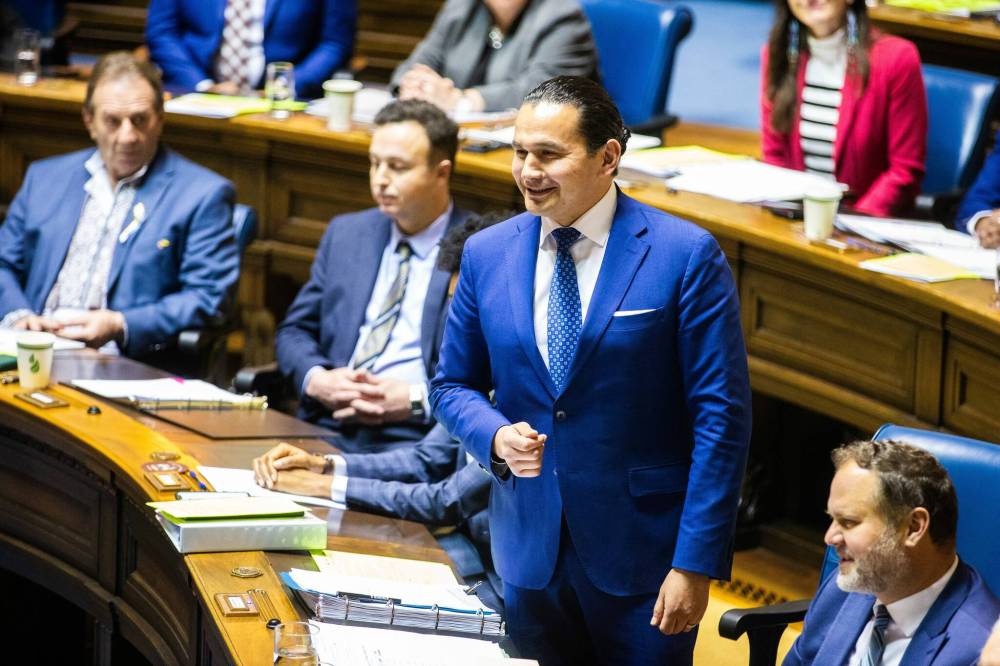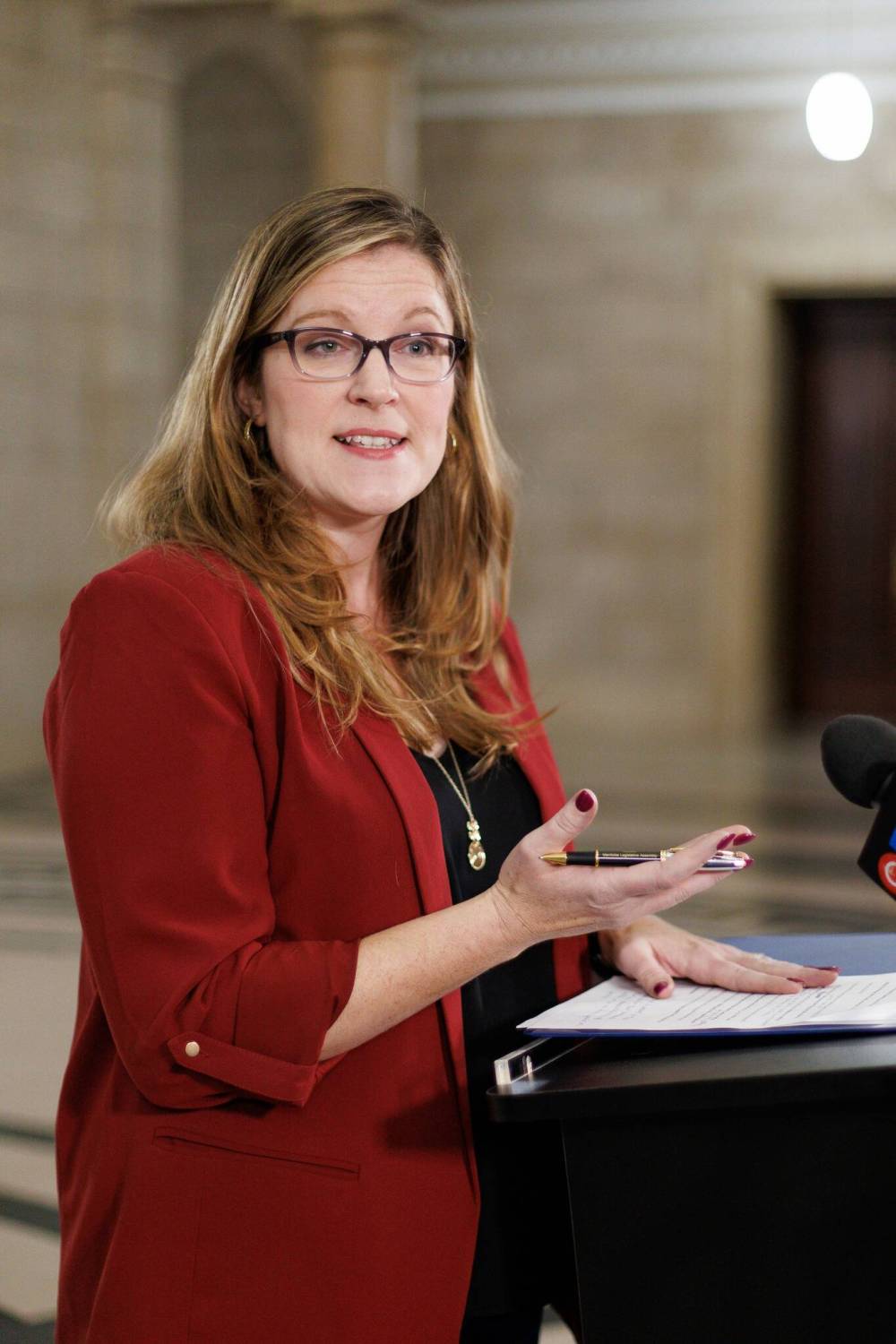Province targets health regions’ reliance on private-agency nurses
Read this article for free:
or
Already have an account? Log in here »
To continue reading, please subscribe:
Monthly Digital Subscription
$0 for the first 4 weeks*
- Enjoy unlimited reading on winnipegfreepress.com
- Read the E-Edition, our digital replica newspaper
- Access News Break, our award-winning app
- Play interactive puzzles
*No charge for 4 weeks then price increases to the regular rate of $19.00 plus GST every four weeks. Offer available to new and qualified returning subscribers only. Cancel any time.
Monthly Digital Subscription
$4.75/week*
- Enjoy unlimited reading on winnipegfreepress.com
- Read the E-Edition, our digital replica newspaper
- Access News Break, our award-winning app
- Play interactive puzzles
*Billed as $19 plus GST every four weeks. Cancel any time.
To continue reading, please subscribe:
Add Free Press access to your Brandon Sun subscription for only an additional
$1 for the first 4 weeks*
*Your next subscription payment will increase by $1.00 and you will be charged $16.99 plus GST for four weeks. After four weeks, your payment will increase to $23.99 plus GST every four weeks.
Read unlimited articles for free today:
or
Already have an account? Log in here »
Hey there, time traveller!
This article was published 23/05/2024 (566 days ago), so information in it may no longer be current.
The Manitoba government is cracking down on nurses working in the public-health system who moonlight for private agencies and promising more money to health regions that use unionized workers.
The Manitoba Nurses Union supports the plan, but the opposition Progressive Conservatives say the NDP government is “forcing” nurses out of private agencies and into the public system.
A memorandum of understanding that’s part of the new contract reached with the MNU can fix the “skyrocketing” use of private-agency nurses, Premier Wab Kinew said in the house this week.
MIKAELA MACKENZIE / FREE PRESS FILES Premier Wab Kinew said the deal aims to draw nurses back to the public system and includes a plan to reduce mandatory overtime and improve nurse-to-patient ratios.
The public health-care system’s reliance on for-profit agency nurses has tripled over recent years and cost the province $56 million in the first three quarters of 2023-24.
“Money is better invested in retaining and supporting our publicly employed nurses,” MNU president Darlene Jackson said in an email Thursday.
“If we are truly committed to fixing health care and improving culture, rather than profiteering off the backs of the patients, we must continue to invest in our public health-care system.”
About 12,000 MNU members voted last week on the four-year deal recommended by the union. Nurses in five of the province’s six health regions voted in favour of the deal that increases wages by 11.25 per cent over four years, improves shift premiums, provides an annual full-time incentive and rewards long service.
However, Shared Health’s 3,400 nurses at the Health Sciences Centre rejected it, and their bargaining unit heads back to the negotiating table Friday.
“Money is better invested in retaining and supporting our publicly employed nurses.”–MNU president Darlene Jackson
Kinew said the deal aims to draw nurses back to the public system and includes a plan to reduce mandatory overtime and improve nurse-to-patient ratios.
The employer commits to making “best efforts to minimize to the greatest degree possible” the use of nurses employed by outside agencies to fill occasional available shifts, according to the memorandum of understanding shared by the MNU.
Such shifts, including those resulting from not filling term or permanent positions for a period of time, will be offered first to nurses at that facility in the public system, it said.
“Only when nurses at the facility, other sites and/or the provincial travel nurse team are not available, will the facility resort to seeking assistance from outside agencies.”
The side deal to the collective agreement also states that health regions “shall not retain or hire as an agency nurse” anyone who is also an employee of the health region.
That raised the Tories’ hackles.
MIKE DEAL / FREE PRESS FILES ‘The NDP are forcing nurses into the public system rather than listening to their concerns and drawing them back in,’ said PC health critic Kathleen Cook.
“The NDP are forcing nurses into the public system rather than listening to their concerns and drawing them back in,” PC health critic Kathleen Cook said during question period Wednesday.
“(The tentative agreement) clearly states that agency nurses are now prohibited from working in their own employment organization. For example, a nurse who works shifts for an agency — and also keeps a casual position at St. Boniface to better control her own hours — now can’t work in the (Winnipeg Regional Health Authority) at all.
“She’ll have the choice of cutting her hours, dropping the flexibility of an agency or being forced to wait for a full-time position to come up.”
Kinew defended the deal.
“It has the building blocks to address what the nurses are asking for,” he told reporters Thursday.
“Nurses — whether they’re working at Health Sciences Centre, rural Manitoba, in the North — have been saying, ‘We want to end mandatory overtime, we want safer nurse-to-patient ratios, we want to have a work-life balance, see our families and be safe in the workplace.’”
Kinew noted the full-time incentive for nurses working in the provincial float pool, established to compete with private agencies by offering flexible scheduling with casual, part-time and full-time hours.
“You could come into the float pool — which allows you to work when you want, in the settings that you want, that gives you that work-life balance and then get a $12,000 financial incentive on top of that,” he said.
A letter of intent attached to the deal spells out how both sides plan to work towards improving nurse-to-patient ratios in the system and chart a course to end mandatory overtime.
“I’m really hopeful that we’re going to be able to use this as the tool to improve patient care across Manitoba,” the premier said.
— with files from Gabrielle Piche
carol.sanders@freepress.mb.ca

Carol Sanders
Legislature reporter
Carol Sanders is a reporter at the Free Press legislature bureau. The former general assignment reporter and copy editor joined the paper in 1997. Read more about Carol.
Every piece of reporting Carol produces is reviewed by an editing team before it is posted online or published in print — part of the Free Press‘s tradition, since 1872, of producing reliable independent journalism. Read more about Free Press’s history and mandate, and learn how our newsroom operates.
Our newsroom depends on a growing audience of readers to power our journalism. If you are not a paid reader, please consider becoming a subscriber.
Our newsroom depends on its audience of readers to power our journalism. Thank you for your support.









